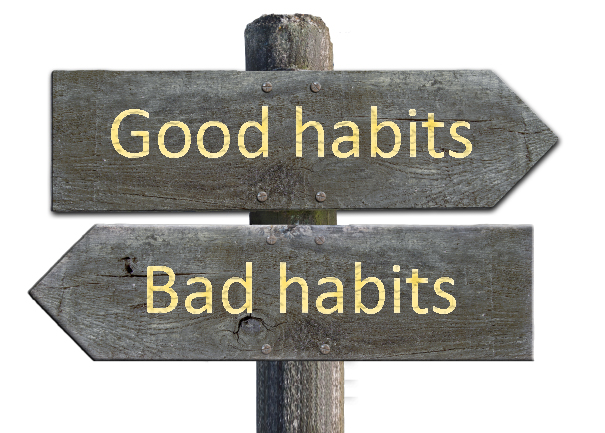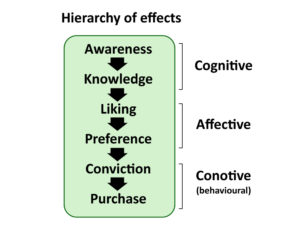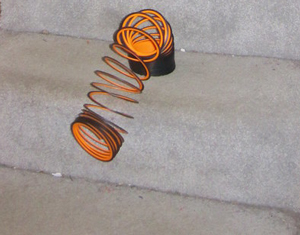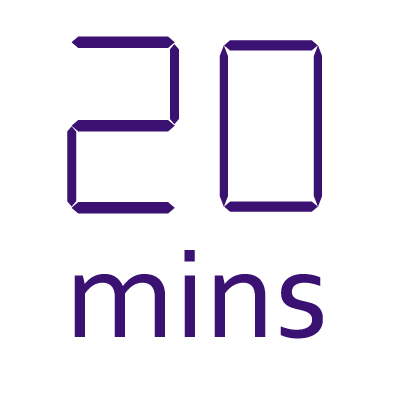Do you notice your (study) habits?
 I sometimes facilitate a workshop on study habits. Sounds boring? Hold on – believe me, it is intriguing and worth investigating. Like my online yoga teacher says, ‘Welcome to the mat. You have invested in being here. Let’s do something.’ And I get hooked every time.
I sometimes facilitate a workshop on study habits. Sounds boring? Hold on – believe me, it is intriguing and worth investigating. Like my online yoga teacher says, ‘Welcome to the mat. You have invested in being here. Let’s do something.’ And I get hooked every time.
Defining a habit
You will find habit defined as a routine or behaviour that is repeated and happens subconsciously as opposed to something you are planning to do once or twice.
Something becoming a habit is something becoming ‘second nature’ to us. Gillam (“Achieving goals for 2020” in January’s copy of Waitrose Magazine), while looking into fitness habits, defines it as ‘building healthy behaviours into one’s lifestyle’ but warns that ‘if you start too vigorously, make sacrifices that are simply too large, if you cannot make meaningful sense of your progress, then this goes against your habits’ and is less likely to succeed.
When it comes to studying, it is worth discussing bad habits and their origins. New (good) habits can be formed when you are aware about your behaviours, goals and circumstances. The typical example given is giving up smoking or drinking alcohol. (This takes us into the territory of habits and addiction. Sorry, I got distracted and sucked into ‘BBC ideas videos’, which I only recently discovered).
Watch this video on fighting procrastination and the distractions that threaten to destroy your good habits.
Covey’s influence
I cannot talk about habits without mentioning ‘the guru’. Back in 1989, Stephen Covey wrote his book “The 7 habits of highly effective people” in which he introduced millions of people around the world to character ethics, taking the inside-out approach. This goes much, much deeper than appearance and personality. It all starts with being aware and pro-active! Read about the history and how it came about here.
This video offers a fabulous visual summary for Covey.
Covey later added an eighth habit in his later book published in 2004 about finding one’s own voice. Finding one’s voice means finding new insights about yourself, others, your learning, environment, task, community, and so on. There are four elements to your voice – mind (connected to talent), heart (related to passion), body (linked to need) and spirit (associated with conscience). Last but not least, developing your own (critical) voice is something that your tutors often ask for in your essays, don’t they?
How habits work
How, you will ask, do habits occur, how do they become routine, what triggers them?
Habits, I highlighted in my session, have stages and scientifically proven ways of ‘happening’. Only after analysing what is happening to you can you act to correct or improve a habit. The stages of the process that maintain a habit are:
- A cue or trigger (external or internal) occurs.
- Routine behaviour takes place in direct response to the cue
- The brain receives a reward in the form of dopamine that creates feelings of relaxation and euphoria, encouraging repetition of the behaviour.
Practising the same routines over and again reinforces nerve connections in the brain that make the routine behaviour easier to repeat.
In another BBC Ideas video, Dr Modgil seems to think flossing is the answer.
How to go about changing things to the better?
Tip 1: Find your motivation – write it down, read it often
Tip 2: Be specific – what exactly do you want to do?
Tip 3: Take small steps
Tip 4: Don’t stop when you are on a roll
Tip 5: Be patient – research shows it takes time to break, change or create habits
The mini version
Let me expand on tip 3. This year, I did not talk about study habits in general but ‘mini-habits’. Have you heard of them? Mini-habits are a super idea for approaching any task in small steps and sticking with it until it is done. If you planned to go to the library once a week this term and spend an entire day on progressing your work, I expect this worked for the first two weeks or so before you got distracted, bored, demotivated or something came up.
Now watch one of the video/s (see which one you prefer):
Take away message
to just 2 minutes at a time.
It is just human nature, in our hectic distracted multitasking world nowadays, for the majority of us to not carry on with your initial plans (sounds like New Year’s resolutions, doesn’t it?).
Mini-habiting (I think I just coined this) owes a lot to effective goal setting and thinking beyond the here and now. I know it’s hard. Circumstances change and there is so much to explore in life. I could never settle on a single type of sport to dedicate all my time and efforts because there was simply too much to choose from until I got hooked, after which I certainly did more than two minutes in my chosen sport.
Habits in numbers
According to a study from University College London, it takes on average 66 days to establish a habit.
There are 3 factors to increase habit strength:
Having a sense of ownership over the goal + Persevering over a three-month learning phase + Keeping things simple.
So, if you want to create a new habit choose a straightforward new behaviour and practice it for at least 2 – 3 until it becomes second nature.

How they do it in advertising
Back in the days when I taught German, I took on a Business language class and had to teach some advertising models. From all the stuff back then the one I remember fondly is AIDA:
A – attention (something needs to grab your attention; note – could also distract you)
I – interest (this advert then needs to spike your interest)
D – desire (this might lead to your desire to go further; do you need this apple watch?)
A – action (well, obvious, here you spring into action – go and buy the product)
Attention = awareness of something you want or need to change in your life.
The reason I mentioned AIDA is that advertising, someone trying to sell you something, reminded me of fighting your inner ‘Schweinehund’ (as we say in German), berating you to start/stop a habit because it is good/bad for you’. But a more critical reading of ‘attention’ + ‘interest’ + ‘desire’ + ‘action’ critically suggests it might be more about consciously starting a new (positive) habit. Read more about this here.
Finally
Once I get down to the living room floor tonight to do my ten sit-ups, I guarantee you I will be up for more once I have started. Who does only ten anyway? You try.

Three steps then:
- Focus on what you can control, then add value. ‘Sharpen the saw’ (if you got to the end of video 2 on Stephen Covey’s book this will make sense!).
- Get in motion, stay in motion. Do you notice your habits now?
- When you want to break a habit, follow Mark Twain: ‘A habit cannot be tossed out the window; it must be coaxed down the stairs a step at a time’.
Good luck!






Leave a Comment (note: all comments are moderated)